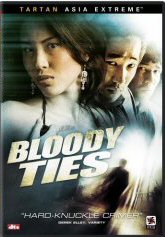
Long before the Asian ghost story was introduced to Western fans, revitalizing the then stale horror genre, cinema across the seas was ripping bare knuckles across the conventions of the crime film. With uncompromising honesty and reckless action, these films were grim in their content yet lyrical in their approach to such mean spirited material as drug addictions, inescapable revenge, and the often bloody loss of family (not to mention the emotional loss of self). Rooted in systems of traditional honor and tragedy common to their own cultural outlook, these films and their craftsmen proved themselves as capable of examining such surpassingly mature themes as honor, family, and culpability as they were in emphasizing new extremes of blood and bullets. Bloody Ties, a new Korean post-noir thriller from Tartan's Asia Extreme label continues this grand tradition, fusing brutal action and urban grimness with a harsh condemnation of urban squalor.
Bloody Ties is at once both a celebration of and challenge to the conventions of traditional crime/action pictures, filtered through a distinctly Asian POV. Concepts of honor and duty are integral to the story to a greater extent than seen in most American fare. In its careful look at mob politics and relationships it is closely related to the traditional Asian gangster films of earlier decades. Yet in its partnership between a criminal and a renegade cop the plot announces its debt to such Asian hits as The Killers. In a world of vice and amorality sets Busan, a den of political and social turmoil. The times are something that Sang-Do (Ryu Seung-Beom) delights in, using it for personal gain. As he reaps the rewards of the drug trade and union problems, Detective Do Kyung-Jang (Hwang Jung-Min) earns his living chasing (and blackmailing) more traditional criminals. Emphasizing components of the different lifestyle/moral approaches of both men, the script follows Kyung-Jang as he keeps his eyes on the activities of Sang-Do, waiting for him to make a mistake. Do Kyung-Jang has a personal vendetta, having lost a partner to drug lords. In a surprisingly mature turn, the story reveals that Sang-Do's life is just as crummy beneath the deceivingly powerful surface; he is forced to live without love or trust in a profession that makes everyone your enemy. When the unscrupulous cop uses this sympathetic 'criminal' to catch a bigger mob connection, the plan backfires and these two men -- these two enemies -- must work together to avoid a bloody death.
Combining the dark look and feel of classical Noir Hollywood crime films of the 1940s with the explosive, sensationalized action of the urban Asian thriller, Bloody Ties packs a visceral, physical punch. The film indulges in hard-knock violence that titillates while never appearing gratuitous. The mean spirit of the film is represented wonderfully by the action and reinforced by the carefully shot Underworld of crime and all the helplessness and hopelessness that it creates. The city itself is important to both the film's look and story. Atmosphere ceases to be simple window dressing here and becomes integral to the deeper themes of the movie, namely the twisted codes of honor that bind people, and how frail those alliances truly are. Morality is itself treated like a part of the atmosphere, light one moment, dark the next. Never stable, the alliances and intentions in this well crafted, carefully structured story are reflected, like its themes, by a gritty Korean underworld that seeps into practically every skin pore and street corner. A refreshing change from the gangster comedies that were revolving around Busan before this, director Choi turns in anything but a typical buddy movie. Unflinchingly dramatic and tragic, logical and nihilistic, this is hard-knuckled drama with something to say. After such works as Bye June and Who R. U?, Choi Ho turns in a commendable directing job, supplying this neo-noir offshoot with verve and honesty, making the old new again as he finds new faces for the oldest instincts. The result is as suspenseful as it is moving, retaining all of the conventions one would expect in a crime thriller yet with more involving characters, and a strong yet unassuming moral sense. What we're left with is a big black-and-blue patch on the skin of humanity, attractive to look at in all its ugliness.
Bloody Ties is presented by cult and art movie champions Asia Extreme in anamorphic widescreen, and sports colors that are a visual mirror of Noir as an expressive visual genre, substituting black and white for murky colors that evoke the blight and moral decay/darkness of the story. Skin tones are realistic, as are the grays of the smoke and shadows that cover the frustrated characters. No significant grain appears, resulting in a clear and vivid print. Audio is featured in both Dolby Digital 5.1 and DTS Surround Sound. Extras are satisfactory if not as plentiful or innovative as some of this companies previous releases. These consist only of "The Making of Bloody Ties," a standard peek behind the scenes, a Theatrical Trailer, and Trailers for other Tartan releases.
Review by William P. Simmons
| Released by Tartan |
| Region 1 - NTSC |
| Not Rated |
| Extras : |
| see main review |